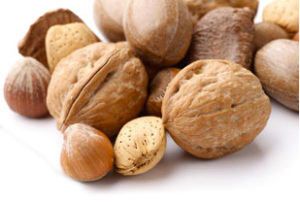 Amazing study results - if true - about some health benefits of eating nuts. Just tree nuts, not peanuts (which are actually a legume). Researchers at the Dana-Farber Cancer Institute in Boston found that colon cancer survivors who ate at least two ounces (57 grams) of tree nuts a week were 42% less likely to have their cancer return or a 53% lower chance of dying from their cancer than those who did not eat nuts. One ounce or a handful of nuts is considered a serving, but two ounces of nuts is about 48 almonds, or 36 cashews, or 96 shelled pistachios, or 38 pecan halves, or 28 walnut halves, or 42 hazelnuts.
Amazing study results - if true - about some health benefits of eating nuts. Just tree nuts, not peanuts (which are actually a legume). Researchers at the Dana-Farber Cancer Institute in Boston found that colon cancer survivors who ate at least two ounces (57 grams) of tree nuts a week were 42% less likely to have their cancer return or a 53% lower chance of dying from their cancer than those who did not eat nuts. One ounce or a handful of nuts is considered a serving, but two ounces of nuts is about 48 almonds, or 36 cashews, or 96 shelled pistachios, or 38 pecan halves, or 28 walnut halves, or 42 hazelnuts.
The benefits of eating tree nuts was so surprising and so big, that the researchers caution that the study needs to be repeated (and improved) to make sure. The problem is that the study was observational, and so can't say a definite cause and effect. Perhaps people eating the tree nuts may also be doing some other protective behavior - thus there is just an association. So can't say for sure, but....the studies are adding up that eating nuts is linked with all sorts of health benefits. From STAT:
Can cashews keep colon cancer patients alive? Study says yes — but cautions abound
Surprising new research scheduled to be unveiled at a major cancer meeting next month suggests that cashews and other tree nuts might be as effective as some of oncology’s most effective treatments at keeping colon cancer from recurring after treatment — and even keeping patients from dying. If the benefit is real, a daily handful or two of cashews (cost: less than $1) could work as well as standard chemotherapy (cost: thousands of dollars). But the reported benefit comes with a big “if.”
Although the study is from a respected clinical trial, this finding was not from the original research but, instead, an add-on. The original trial randomly assigned colon cancer patients to either of two drug treatments. Later, researchers looked at cancer survivors who simply went about their lives, doing as they pleased, and tried to evaluate whether eating nuts was associated with better outcomes.In that kind of observational study, it’s not possible to say whether a given behavior — in this case, eating nuts — caused an outcome, or was instead simply associated with the true cause.
Even the study’s lead author was cautious. “This is the first study to show an association between nut consumption and cancer outcomes,” said Dr. Temidayo Fadelu of Dana-Farber Cancer Institute. “When you see an association that is more dramatic than you expect, you have to repeat [the study] in another [group of patients]. … There could be underlying confounders that we didn’t control for.” In other words, people who eat tree nuts, such as pecans, almonds, and walnuts, might be different from people who do not, something called “healthy patient bias.” They “might be more health-conscious,” said Shah. They might be wealthier, or better connected to the health care system, or have healthier habits in general. Any of those attributes might help patients survive colon cancer.
The researchers did not find an association with eating peanuts. Only tree nuts seemed to matter, to an eye-popping degree. Of 826 patients, those who reported having two or more servings per week (as 19 percent did) had a 46 percent lower risk of their cancer returning and a 53 percent lower risk of dying than those who said they did not eat tree nuts.
The study is an outgrowth of a famous clinical trial that began in 1999, testing chemotherapies in 1,264 patients with stage 3 colon cancer (meaning it had spread to lymph nodes but not to distant sites like the liver and lungs). Some patients filled out questionnaires about diet and lifestyle, once while receiving chemotherapy and again six months after treatment ended.
Fadelu and his colleagues studied nut consumption because that has been associated with lower mortality, mostly because of a reduced risk of cardiovascular disease. “We definitely think something is going on,” with tree nuts providing a biological benefit, Fadelu said. For one thing, they decrease insulin resistance, “a potential mechanism” by which they might keep colon cancer from recurring, he said.
